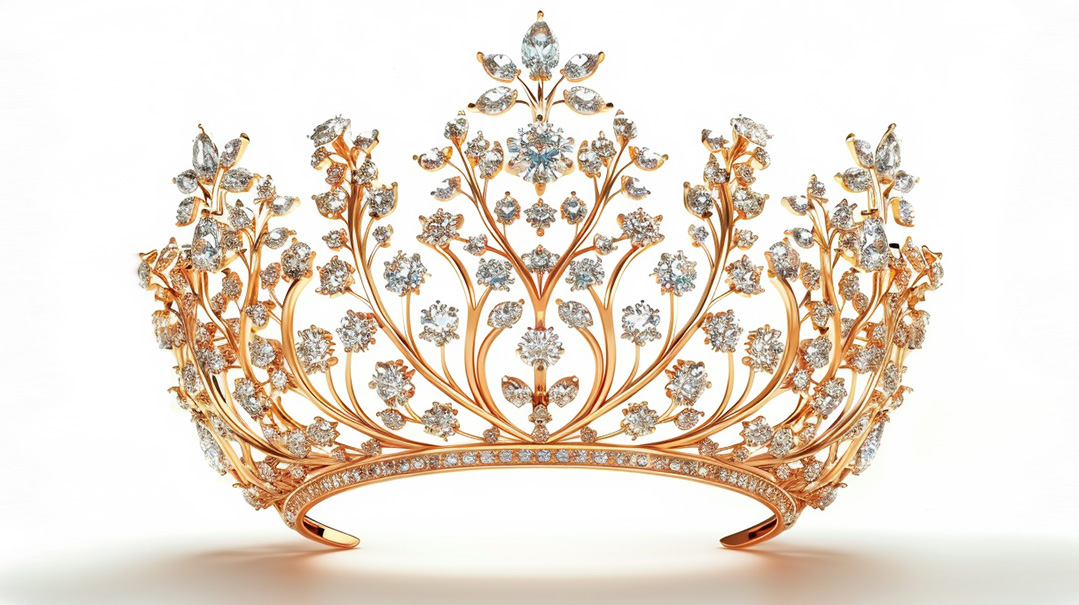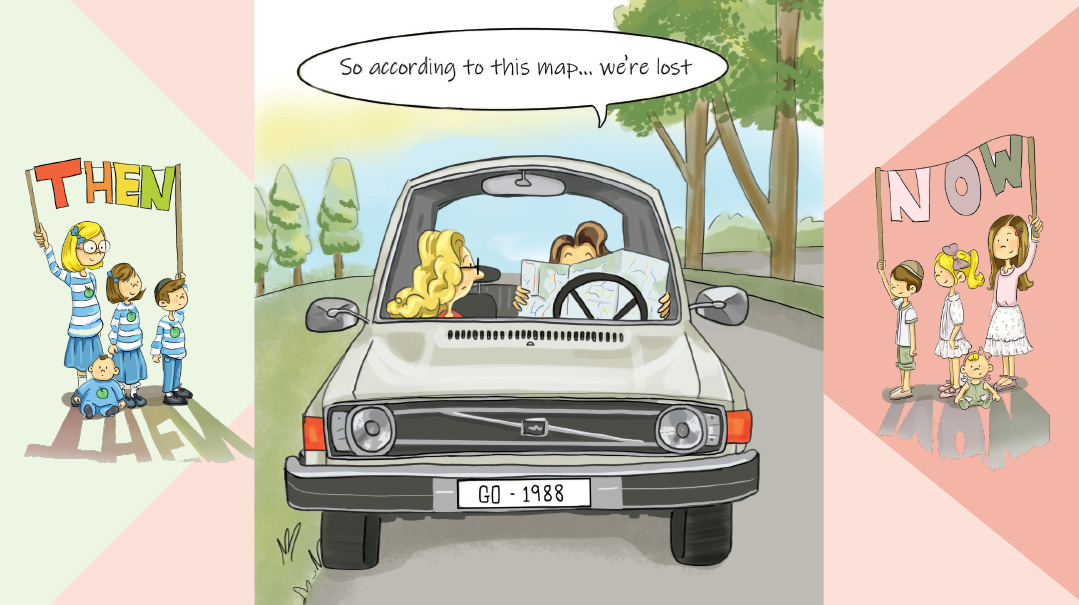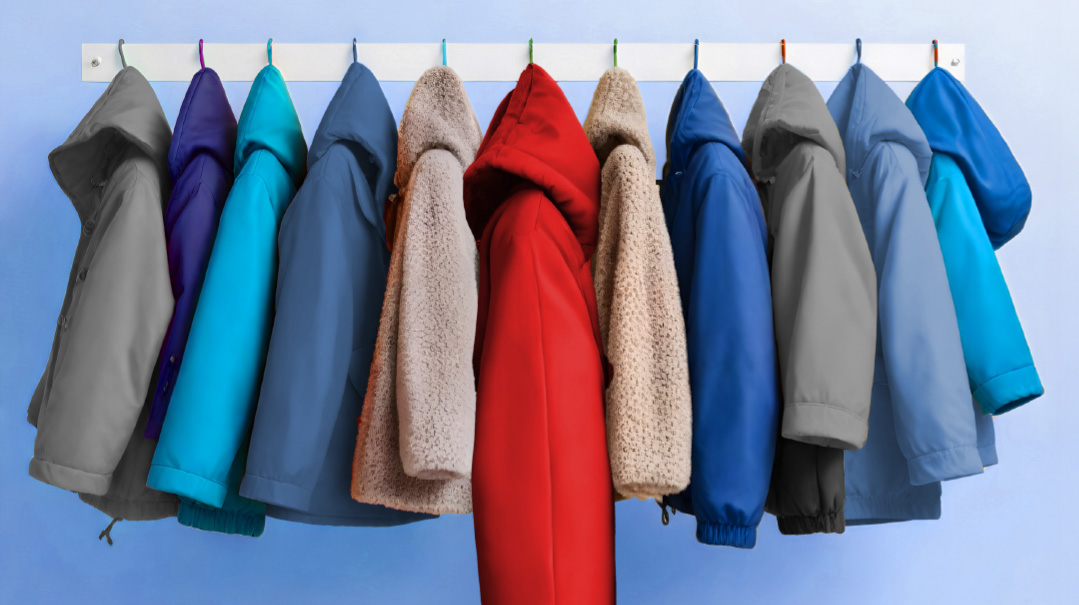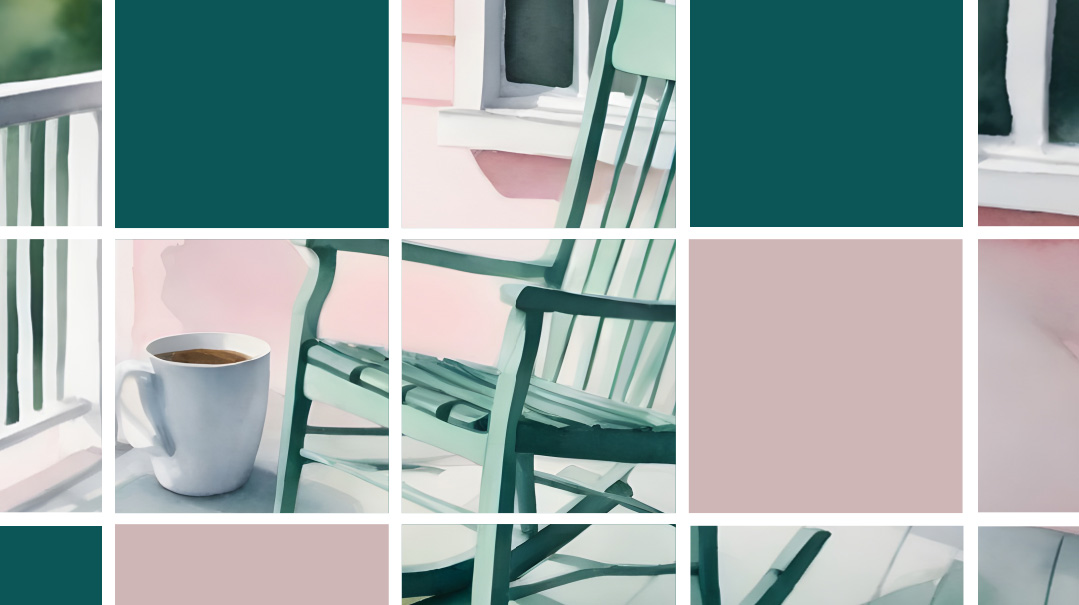Hers for Eternity
| May 26, 2020“Why am I smiling instead of crying? Because emunah is simchah and simchah is emunah"
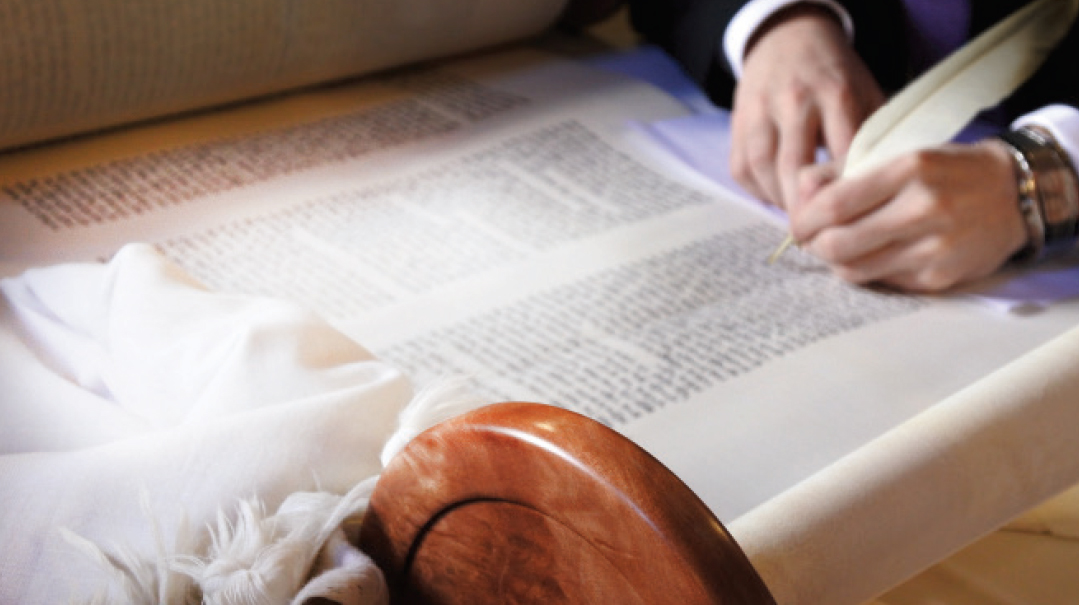
The Bnei Brak street where we are supposed to meet is deserted. The sun peeks out from the clouds, but the intermittent showers are keeping most people behind their doors.
My interviewee settles onto the bench beside me, smiles, and introduces herself, “I’m Doba’le Stern,” before launching into her story.
“I have no grandchildren and children,” she begins, “and I have no siblings or in-laws. My husband, Tuvia z”l, passed away almost a quarter of a century ago, and all of my extended family ‘disappeared’ in the Holocaust.”
“So, you’re… you’re basically here alone.” I talk slowly, searching for the right words.
She shudders. “Never! I have the Ribbono shel Olam, the shtiblach, and my sefer Torah too.” Her eyes sparkle as she speaks.
Several orange bird-of-paradise flowers sway with the wind at the end of the block. She gestures toward them. “Let’s walk while we talk.”
“What wonderful weather there is today and always,” Doba’le says.
“Bli ayin hara, Mrs. Stern.”
She waves my words away. “Meideleh,” she says. “Nothing bad comes from Hashem.”
Strong Foundations
Doba Kozack was born in Warsaw, Poland. Her father, who was very close with the Slonimer Rebbe, spent his days in the beis medrash. She recalls her mother as “a true Yiddishe mamme” who would stand over her pots davening.
The impoverished family of eight — “We had no coins, and certainly no bills,” Doba recalls — lived in a cramped basement. The six siblings slept together on a surface on the floor, their heads lying on a pile of rags that served as their pillows.
When Doba’s oldest brother, Moshe, went to learn in Rabbi Elchonon Wasserman’s yeshivah in Baranavich, the family couldn’t afford train fare, and so her brother would lie beneath the train benches, jolting up and down on the tracks, until he reached the famous yeshivah.
Doba’le, the youngest, doesn’t recall any of her siblings ever complaining about the situation. “We greatly admired our father’s Torah learning and automatically had mesirus nefesh for it. We gladly paid the price of ‘pas b’melach tochal — eat bread with salt, and drink water sparingly.’ ”
When it came to his children’s chinuch, Doba’le’s father cut no corners, hiring the best melamdim for her brothers. Doba’le was among the first students to attend Warsaw’s Beis Yaakov.
The Kozack’s basement was in close proximity to Warsaw’s bustling marketplace, which offered an abundance of fresh fish and juicy vegetables all week long. On Thursday evenings, when the merchants left their stalls, all unpurchased merchandise was left over for the cats and panhandlers.
“We’d go out and collect the leftover fish and vegetables for Shabbos,” Doba’le remembers. “Our mother would turn them into delicacies, creating something from nothing.” She laughs. “My childhood wasn’t a childhood of luxury, but it wasn’t a childhood of want either. Ours was a life of ahavas haTorah.”
But then World War II broke out, and the angels of destruction swooped down upon the city of Warsaw, bringing havoc and devastation in their wake.
Young Doba’le, just 12 or 13 years old, left the ghetto in search of bread for her family. “German soldiers caught me red-handed,” she recalls.
She was released by the 9th infantry division a short while later. But by then, none of her family members were still in the ghetto. “I never saw my father, mother, Moshe, Kalman, Yankel, Dovid, or Rivka’le again. They were all taken to Treblinka or Auschwitz. They are surely sitting in Gan Eden; only I am still here in the land of the living.”
On Her Own
Somehow, the determined young girl found the strength to go on. One day, when she was wandering the village in search of food, she noticed an elderly man, obviously blind, who was feeling his way around. She approached to help clear a path for him, then realized he was muttering in Yiddish. Curious, she drew closer. She realized was saying he would provide food for anyone who accompanied him. “Obviously, I volunteered for the job,” Doba’le says.
Doba’le and the blind man reached a hut on the outskirts of the village. The blind man knocked on the door and a Polish farmer woman opened it slowly, clearly suspicious of the unusual couple. The blind Jew began singing a non-Jewish song, and the woman smiled, then poured them bowls of nourishing soup for them.
The blind old man and lone girl wandered around together for several weeks. They knocked on huts and shacks and lived off of bread crusts and leftover soup.
“I helped the man walk and he took care of providing food for both of us, but one day he disappeared,” Doba’le says. “He must have been a Heavenly messenger sent to find me food.”
Doba’le was alone once again. “I went around knocking on farmer’s doors and begging for food when suddenly I discovered a light at the end of the tunnel.” Doba’le laughs. “A true tunnel.”
Doba’le had stumbled upon an underground bunker where Jews were hiding. The Jews invited Doba’le to join them. They remained hidden in the bunker, venturing out only when their food supply ran low. Then they’d search for anything edible — corn, flour, sugar. Even the smallest crumb was priceless.
“One day, while we were getting ready to knock on yet another door to search for yet another crust of bread, a group of SS soldiers arrived,” Doba’le recalls. “All of us were thrown into cattle cars.”
Doba’le, orphaned and alone, suddenly found herself on a crowed transport headed to the work camp of Skarzysko-Kamienna.
“In the work camp,” she says with a sigh, “I was forced to work in a German bullet factory. My coworker, another Jewish girl, needed to fill the German bullets with gunpower while they were painted a fresh coat of paint. I’d then put them into heavy cartridges that weighed at least 35 pounds, and bring them to the train tracks where the equipment was shipped off.”
“We’d line up for roll call and counting every morning. We were beaten with leather whips as we walked — Faster! Faster! How much strength did our legs have?” Her smile turns bitter. “Our salaries were very fair. Jews received whippings while Christians received bowls of milk.”
From there, she was sent to Auschwitz. It’s a place she can’t discuss. Her eyes fill from the mere mention of the place. I quickly change the topic.
“Doba’le, when did you immigrate to Israel?
“I was fortunate to come to the Holy Land, the land of the living, in 1948. UNRWA took care of my immigration. I can never return to my birthplace, to Poland.”
Emunah and Happiness
In Israel, Doba’le married Rabbi Tuvia Stern. Tuvia, who was a good number of years older than her, had immigrated to Eretz Yisrael from Poland before the war, along with his family.
Tuvia’s parents opened their hearts and wallets generously to their daughter-in-law, providing her trousseau and ensuring that she be led down to her chuppah like a regular bride. Accompanied by Tuvia’s relatives, Doba’le celebrated her wedding without any of her own relatives or acquaintances.
Doba’le’s greatest desire was to leave her shattered past behind and to raise a family.
“The Ribbono shel Olam however, had another plan,” she says with a smile. “Why am I smiling instead of crying?” she asks, reading my mind. “Because emunah is simchah and simchah is emunah. One cannot survive otherwise.”
I quickly try to transcribe her words.
“No.” Doba’le shakes her head. “This isn’t something that exists only in writing. It’s a way of life.”
“I’ve been living in a small apartment on Rechov Katzenelson in Tel Aviv since my marriage,” she continues. “I’ve never allowed sadness into my home, or even onto the welcome rug at the door. I’ve always attempted to find ways to inject massive doses of simchah into my life.
“I’ve volunteered to help the elderly, fed the sick, visited the lonely, and fallen in love with chesed. Over the years I’ve discovered an interesting phenomenon: When I give of myself to others that fills me with joy. Isn’t that amazing?”
Winning Numbers
During the early years of her marriage Doba’le Stern started buying a lottery ticket each week. “I’d play around with the numbers of our wedding date, trying different combinations each week. Left to right, right to left. With spaces, without them…
“Tuvia would laugh and remind me that millions of people entered to lottery, then suggest that instead I give the money to tzedakah. But I was sure that one day we’d win, and then we could give even more to tzedakah.”
One drowsy sunny morning, Doba’le recalls, she was walking along Rechov Allenby in Tel Aviv, a smile on her lips, when she bumped into Rebbetzin Reizel Mond.
“Rebbetzin Mond was a very special woman,” Doba’le remembers. “She and her husband were prominent personalities in Tel Aviv’s Belzer shtiebel, their house always brimming with chassidim and rabbanim. There aren’t many people like her these days, and there weren’t many like her in the previous generations either.
“We’d first met as newlyweds at the grocery, or the park, or maybe it was at a simchah. The Rebbetzin struck up a conversation, then asked about my family and children. When she heard that I had neither, she told me that she was my family. From that moment on, we kept up a warm connection that lasted for years.”
That morning on a Tel Aviv street corner, as the two stood next to a dimly lit makolet, the Rebbetzin greeted her. “Doba’le, why are you so happy today? Anything special?”
With complete confidence, Doba’le replied, “Today’s my day. I’m going to buy a lottery ticket, and I have no doubt that with Hashem’s help I will win.”
The Rebbetzin smiled at Doba’le. “Perhaps she wanted to comfort me, or maybe the smile was out of pity,” Doba’le says. “I’ll never know. In any case, she surprised me by asking to become my partner in buying a lottery ticket. I was excited that the chashuveh Rebbetzin was asking to become my partner!
“Without even stopping to think about it, I said, ‘Of course, you’re a tzaddeikes. I’d be so happy to have you pull the card from the pile.’ As was characteristic of her, the Rebbetzin refused, telling me, ‘No, Doba’le. Today is your day. You pull out the ticket.’ “
Doba’le entered the makolet and selected a ticket, then pocketed the receipt, thanked the Rebbetzin, who had not yet paid her for her share in their “partnership,” and the two parted ways.
***
That week was Tuvia and Doba’le Stern’s wedding anniversary. The winning lottery ticket number? Their wedding anniversary date. They’d won $50,000, a staggering sum for the 1970s.
As soon as Doba’le learned that she’d won, she unhesitating made her way toward the Mond’s house and placed half of the money on the table: $25,000 in cash. Rav Simcha Mond refused the money.
“Mrs. Stern, this money is yours. Keep it and build a five-story house with all of the luxuries in the world for yourself.”
Doba’le, however, stubbornly refused. “This money belongs to both of us. The Rebbetzin and I had a partnership.”
Rav Mond was taken aback. He banged his shtender. “What a difficult test! To go to your partner, who doesn’t even know that your number won, who didn’t even pay for her part of the ticket yet, and to give her half the sum… Mrs. Stern! What an incredible challenge you have!”
It didn’t even feel like a test to Doba’le. In addition to the $25,000 that she’d already placed on the table, she placed another $2,500 on Rabbi Mond’s shtender and said, misty-eyed: “Rabbi, this is a tenth of my lottery money. Please take this money as maaser and give it to mosdos of Torah and tefillah.”
When she returned home, she handed the remaining wad of money to her husband. “Tuvia, this is for you. What do I need for myself already?”
Eternal Acquisitions
Tuvia invested the lottery money his wife had given him in real estate, earning solid dividends on his investments. Doba’le bid her lottery-purchasing hobby farewell.
In the meantime, Rebbetzin Raizel Mond passed away. Doba’le began going to Rav Mond’s house each day to cook for him and clean the house. Soon, the chassidim gathered there began requesting brachos from her.
“I was embarrassed by their request,” she recounts. “Me? Since when was I a rebbetzin? How could I give brachos? But Rabbi Mond would look on from the side and encourage his chassidim, ‘Ask her. She has the koach of brachos.’” Doba’le winks. “And when a Jew asks, you don’t tell him no.”
I realize that’s my cue. I relay names and bakashos to Doba’le who repeats them with her eyes closed. Plonis bas plonis should have yeshuos, nachas, gezunt, and shidduchim. She looks at my infant daughter sleeping in her carriage and blesses her that she merit to marry a talmid chacham.
A wind rustles the trees overhead. Doba’le reminisces about the women and girls who used gather together at Rebbetzin Mond’s house and beg her to sing the song, “The Girl from Treblinka” in Yiddish.
“Twenty-four years ago Tuvia passed away,” Doba’le tells me. A few drops of rain fall, almost as if the sky is sharing in Doba’le’s grief. “I sold the property that he’d purchased and decided to go into real estate as well. Real estate of a different kind. Instead of buying buildings for residential purposes I’d build homes of Torah and tefillah.”
Doba’s Business Deals
Doba’le’s first two “business deals” included constructing beautiful shuls, one named for her husband, one named for her. As she talks about the chanukas habayis for Tuvia’s shteibel, Doba’le’s face grows animated; she looks like a mother of the bride.
“Do you know what a zechus it is?” she asks. “There are minyanim around the clock at Tuvia’s shteibel, one long chain of Shacharis, Minchah, and Maariv. Every tefillah, Kaddish, Amen yehei shmei rabba, and brich hu is a zechus for Tuvia. Do the math: 365 days a year, times three tefillos a day. What greater nachas can there be than that? What business is more lucrative?”
Her face shines as she talks about the special sefer Torah that she donated to Tuvia’s shul. She hired a devout sofer and yirei Shamayim to write the Torah, not prepared to settle for anything less than the best.
“The whole of Meah Shearim dressed in their Shabbos clothes. The police closed the streets to traffic, and everyone who saw the dancing came outside. Hundreds of chassidim wearing shtreimlach, and gold-striped Yerushalmi bekeshes danced through the alleyways.
“Hundreds, maybe thousands, of children dressed in Shabbos clothes danced with torches. Neighborhood women told me that it had been years since Meah Shearim had experienced such a simchah.”
Whenever Doba’le is in Reb Tuvia’s shul, people approach her. “Rebbetzin, please bentsh me.”
“Yiddelach,” she says. “Go daven and learn Torah. That will be your merit more than my brachos.”
Doba’le takes great pride in her second offspring as well, Beis Feiga Doba in Ashdod. “It will continue to bring me nachas after my 120 years.”
***
The sun is back out. Doba’le pulls out a thick album from her large bag.
I flip through the albums, sizing up the pictures of the shuls, the ezras gevarim, ezras nashim, lecture halls, shiurim rooms, bookcases of seforim and siddurim, chuppah, atzei chayim, and Torah crowns.
There is a picture of a paroches with the words: “L’illui Nishmas Reb Tuvia z”l ben Reb Ben Tzion z”l” and “L’illui Nishmas Reb Noach and Tilah Kozck Hy”d,” Doba’le’s parents, embroidered across it.
“You know how every grandmother takes pride in her grandchildren? Well, I’m that way too. Look at these cute children with their curly peyos holding these burning torches at the hachnassas sefer Torah. Look at these happy children holding the rope in front of the chuppah. And look at these avreichim, dancing with enthusiasm in honor of the Torah.
“Look at the Jewish nachas that I’ve baruch Hashem been blessed with.”
(Originally featured in Family First, Issue 694)
Oops! We could not locate your form.

